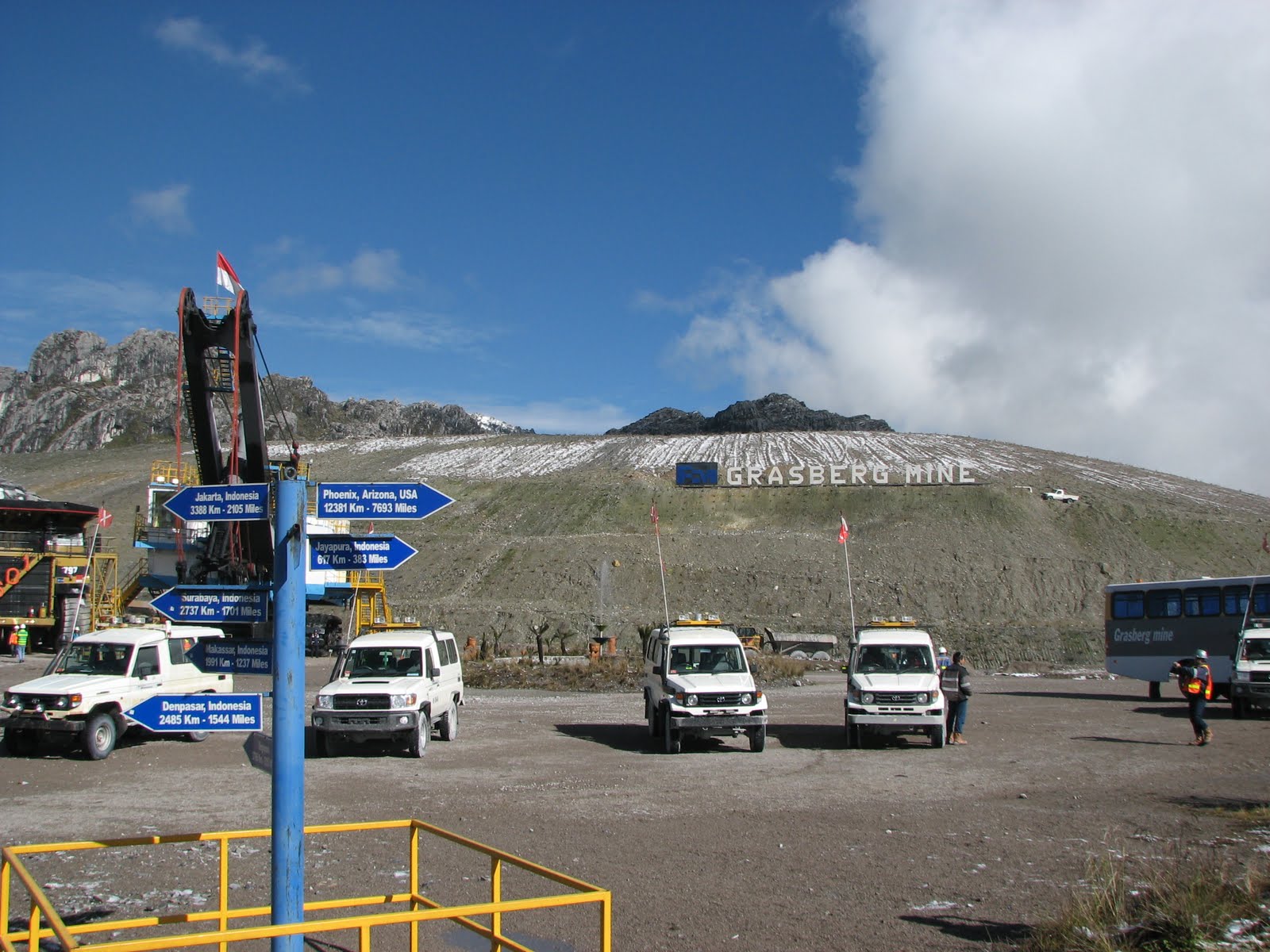As I write, copper for September 2017 delivery is trading for $3.07 per pound. The red metal is at 2-year highs. It’s up over 20% over the past year.
In other words, it’s a bull market in copper.
And that’s why the following statement is so crazy: One of the world’s largest copper producers just lost one of the world’s greatest copper mines.
This week, the Indonesian government and major miner Freeport McMoRan reached a “settlement” where Freeport’s ownership stake in the colossal Grasberg mine (located in Indonesia) will be reduced from 90.64% to 49%. The reduction in ownership will go in favor of the Indonesian government, which feels it deserves a larger share of the mine.
Image: Freeport’s Grasberg Mine
Grasberg is one of the world’s largest, most productive gold and copper mines. Building it required $12 billion in investment. And the Indonesian government essentially just stole about 42% of it. Freeport tried to fight the move, but ultimately Indonesia said take a partial reduction or we’ll shut down the mine and move towards a 100% reduction. To be fair to Indonesia, it says it will pay Freeport shareholders for its stake. But it will surely be at a ridiculously low price… and Freeport will no longer be a majority shareholder (which is worth a huge amount of money).
However you paint it, it’s a major loss for Freeport shareholders over the long-term. They’re learning the hard way that it’s essential to base your resource investments in resource-development friendly countries like the U.S., Canada, and Australia… while being very wary of selected countries in Asia, the former Soviet Union, and Africa.
In other words, they’re learning why they should put my AK-47 Indicator to use.
Over the past decade, I’ve written a lot about how nationalization is one of the biggest – yet most underrated – dangers for resource investors. While nationalization comes in many forms, it is essentially a government breaking legal contracts and stealing from a business and its shareholders.
As cash-strapped governments look for emergency sources of revenue, they often turn to confiscating physical assets like oil fields, gold mines, and copper mines. Doing so is typically an easy sell to the public. Much easier than stealing a beer or some candy. The government can say the oil or gold is part of the country’s natural heritage. The politicians get the added bonus of sticking it to Whitey.
Early in my investment career, I really enjoyed the excitement of risking capital in exotic lands like Indonesia. The site visits were exciting. But as I wrote in an educational piece that could save you a fortune called How To Use The AK-47 Indicator:..
Over the past 17 years, I’ve been all over the world—often to places that many people would never dare to go. Besides Iraq, I’ve traveled to Kosovo, Venezuela, Russia, China, Argentina, Colombia, Mexico, Turkey, Nigeria, Kenya, Ethiopia, and dozens of other countries.
Yet if you read my work and look at my portfolio these days, you’re sure to notice a lack of “third world” excitement that many resource investors crave.
As a new resource investor, it’s hard not to get interested in the excitement and drama that comes with investing in far-off lands. After all, many countries in Africa, Asia, and South America are less picked over by exploration geologists. You get to visit new places and meet interesting people. And the prospect of finding the next giant gold deposit in some jungle is just plain exciting. All these things got me on many plane trips.
Yet, now…after many successes and many mistakes, I tend to avoid places where people hold AK-47s in the streets.
All the travel I’ve done…all that time spent on planes…has shaped my portfolio and the research I write today… which overwhelmingly features companies that I can take my friends and family to visit the operations, safely.
In other words, after flying millions of miles on planes and visiting more than 100 countries, I’m right back home. But the reason I invest so heavily in Canada and other English-speaking countries isn’t nostalgia for where I’m from…it’s strictly a matter of making money.
I’ve learned the hard way that if you’re interested in making money, you need to trade excitement for boring old rule of law and a simple respect for business.
The places where people with AK-47s walk the streets tend to be the places that have very few of the roads, bridges, power lines, railroads, and ports needed to transport raw materials. That kind of infrastructure is critical for turning resource deposits into free cash flow. The places where people walk around with AK-47s also often lack contract laws, property rights, and worst of all, respect for human life.
If you’re reading this, there’s a good chance you live in the U.S. or Canada. As much of a SOB as you think the politician in your state or province is, trust me, he has nothing on the average lunatic running a third-world country. Or think of it this way: if Donald Trump doesn’t like you, he sends out a nasty tweet. If your average third world dictator doesn’t like you, he sends out a hit squad.
After doing business all over the world – and in more than a few war zones – I now much, much rather put my capital to work in countries with long histories of respecting contracts and property rights, and which have the roads, power lines, bridges, and ports that are critical to extracting and transporting natural resources. I say let the novice investors have all the third-world excitement they want. I’ll take the money.
As Freeport shareholders are learning, where your resource investments are located is critical to your success. It’s important enough that I’ll state it again: Investing in the U.S., Canada, Australia, and the small handful of countries with similar respect for property rights, contracts, and rule of law may not be exciting, but if you’re looking to preserve and grow your capital, those places are like American Express, everywhere you want to be.
Regards,
Marin
Ps. I am working on the final stages of due diligence on an exciting new junior gold company. We went to visit the property and we were the only newsletter that was on the trip. I will reveal the name of this company in 5 days when the next issue of Katusa’s Resource Opportunities is published to subscribers. For details on how to sign up and get the full details on this stock that could return a quick 50% in 3 months on favorable drill results, click here.
Disclosures and Disclaimers
Marin Katusa, Katusa Research Inc. (“Katusa Research”), and/or the other principals, partners, directors, and officers of Katusa Research (the “Katusa Research Team”) own securities positions in, and are long on, the following companies mentioned above: none
Additionally, members of the Katusa Research Team currently intend to acquire securities in the following companies mentioned above: none
No members of the Katusa Research Team have received any commission or other compensation to feature any company mentioned in this newsletter nor are they party to any financial arrangement regarding the securities of such companies or any person who has any interest in such securities. The information contained in this publication is not intended and does not constitute individual investment advice and is not designed to meet your personal financial or investment situation or needs. Neither Marin Katusa nor Katusa Research is registered broker-dealers or financial advisors. Never make an investment based solely on what you read in an online newsletter, including this newsletter, especially if the investment involves a small, thinly-traded company that is not well known. Past performance is not indicative of future results. You should independently investigate and fully understand all risks before investing. When investing in speculative stocks, it is possible to lose your entire investment. Information contained in such publications is obtained from public sources believed to be reliable, but its accuracy cannot be guaranteed. Further, the views expressed herein are of Katusa Research as of the date hereof, are subject to change and the Katusa Research Team does not undertake any obligation to update such information or views. None of the members of the Katusa Research Team shall be liable for any damages, losses, or costs of any kind or type arising out of or in any way connected with the use of this newsletter. The information in this publication reflects the current opinion of the publisher, is subject to change, and may become outdated. The publisher undertakes no obligation to update any such information.
Unauthorized Disclosure Prohibited. The information provided in this publication is private, privileged, and confidential information, licensed for your sole individual use as a subscriber. Katusa Research reserves all rights to the content of this publication and related materials. Forwarding, copying, disseminating, or distributing this report in whole or in part, including substantial quotation of any portion the publication or any release of specific investment recommendations, is strictly prohibited.
Click the link to review the detailed Terms and Conditions.




